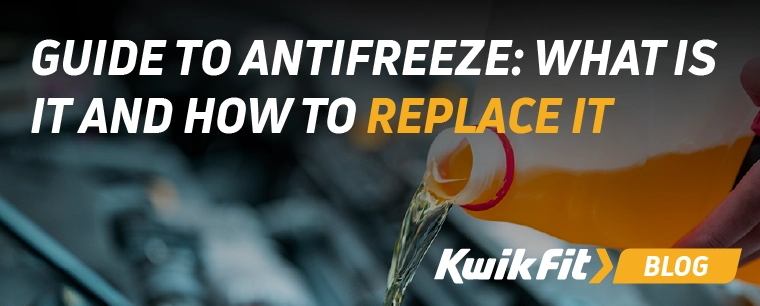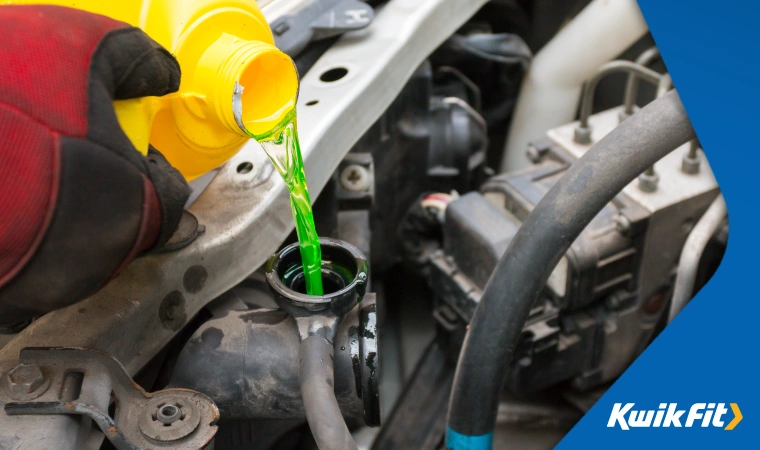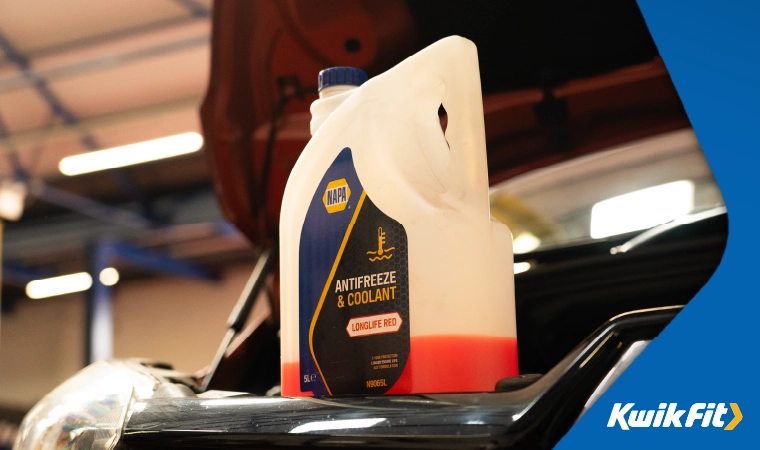Guide to Antifreeze: What it is & How to Replace it
Jack Dreyer | Monday 2nd September 2024 9:30am

Antifreeze, coolant, engines, reservoirs, and tubes – what does it all mean? Browsing through the coolant section of an auto shop can often feel like walking past a rainbow: what are all the colours for? How do you know when you need to replace it?
Checking your coolant level should be part of your regular vehicle maintenance schedule, so let’s look at what it is, why it’s so important, and what to do if you need to top it up.
What is antifreeze and what is coolant?
In short, antifreeze is a liquid that gets added to an engine’s cooling system to reduce the temperature at which the water in there freezes (meaning it can get colder without freezing). While antifreeze and coolant often go by different names, they are the same thing. They should really be called “engine regulant” or something official-sounding like that because their job is twofold: to stop engines getting too hot in the summer (or when the engine is running particularly hard), and to stop them getting too cold in the winter.
In cold weather, water naturally has a freezing point of 0 degrees celsius. However, when antifreeze is added, this ‘freeze’ temperature is lowered dramatically.
Should the water in the cooling system freeze, serious damage could be caused to not only the radiator, but other crucial engine components. This can cost an awful lot to repair or, in some cases, require the components or whole engine to be replaced entirely.
Antifreeze also puts in a shift during the warmer months. It also raises the boiling point of the coolant to prevent your engine from overheating. As well as this, the chemicals inside the antifreeze work to reduce corrosion rates, assist in heat transfer processes, and prevent scale from building up inside your engine.
How does coolant work?
Without going too much into the science, water is mixed with “an antifreeze” – which means a chemical agent that increases the boiling point of the water. Increasing the water’s boiling point also decreases the point at which it freezes because it develops a greater capacity for taking on and transferring heat. The idea here is to make sure that the coolant stays in its liquid form – because if it freezes it’ll expand (breaking any rigid components in the pump).
There are many variations of additives, but the most common ones are ethylene glycol and propylene glycol.
Products like de-icer sprays and screen wash also contain antifreeze, helping to clear an icy windscreen effortlessly and ensure your windscreen washer feeds do not freeze respectively.

What to do when you run out of antifreeze
Your best bet is to get into the habit of having spare coolant, engine oil, and screen wash in your car boot at all times. Running an engine without any coolant at all is likely to cause real trouble.
Ideally it would be as easy as taking yourself to a local petrol station and buying some antifreeze. But you might need an alternative now, or, you might be baffled by all the different options available. Let’s take a look at what you can do.
What antifreeze do I need?
Antifreeze contains corrosion inhibitors which extend the life of your coolant, however different inhibitors are used by vehicle manufacturers and choosing the wrong one could result in damage to your engine components and deterioration of the seals.
As a general rule, vehicles manufactured before 1998 require a silicate-based antifreeze whereas those manufactured after 1998 use organic acid technology (OAT) based antifreezes but there are exceptions and some modern vehicles use a combination of inhibitors.
Always check your vehicle handbook before topping up your coolant levels and if in doubt, contact your local Kwik Fit centre who can advise on the correct antifreeze for your vehicle and also check the strength of your existing antifreeze.
What do the different colours of antifreeze mean?
If you’ve been stumped by the various colours of antifreeze, we don’t blame you! Do they have any real differences? Here’s a quick rundown of the basics:
Green antifreeze is most likely an old formula that uses Inorganic Additive Technology (IAT). This was the first form of antifreeze developed and was used until well into the 90s. It’s called “Inorganic Additive” technology because it uses inorganic materials to achieve the antifreeze and anti-corrosive effects: specifically, phosphates and silicates. It usually needs changing around every two years as well as checking monthly or before every long journey.
Orange antifreeze is a coolant that uses organic acids (though neutralised so they don’t burn through anything) as corrosion inhibitors and azoles as antimicrobial agents. These are usually orange or red and need replacing around every five years in addition to checking monthly or before each long journey.
Red antifreeze is usually a Hybrid Organic Acid mixture that combines benefits of both other types. It is also able to last up to five years but should be checked monthly or before each long journey.
So which colour antifreeze should you use? With so much variation in available coolants these days, don’t rely on the colour of what’s in your reservoir to make a guess. Check your car’s maintenance manual for what’s required.

Antifreeze alternatives
Ok, so you’re still out of antifreeze and the school run isn't getting any easier. Since you should really only turn to antifreeze alternatives in an emergency (and this is an emergency), we’ll let you off this once.
Below are a few alternatives to antifreeze that can be considered in an emergency:
Water
If you’re in a jam, plain, distilled water is your best bet for a temporary fix. It is better to have some liquid in your cooling system rather than none, after all.
However, using water as a replacement coolant comes with a caveat. Unlike antifreeze, the freezing point of water is much higher. This runs the risk of your pipes freezing if your car is left to sit in cold conditions for too long. Hence why water should only be used as a highly temporary convenience, not as a long term alternative.
If you can, pour some water into the empty antifreeze bottle and then into the reservoir to get any remaining liquid out.
‘Homemade’ antifreeze?
Again, take this with a pinch of salt. If good quality engine coolant cannot be obtained, then there is always the option to make your own to prevent damage to your engine.
Since engine coolant is made from water and ethylene glycol (the chemicals making up antifreeze), some people opt for a makeshift option. However, it is strongly recommended that you seek professional advice when tampering with your engine and the fluids in your vehicle as it can be extremely dangerous. Why not let the experts at Kwik Fit help you out instead?
Eco-friendly antifreeze
Some drivers disregard antifreeze as a viable option for their vehicles altogether. Instead, the environmentally conscious may opt for a greener alternative. ECO2 is a plant-based antifreeze alternative that, when mixed with water, has the potential to lower the freezing point of the coolant significantly, reducing concerns surrounding expansion and bursting pipes.
As with any alternative to ’the real deal’, however, we would strongly advise you to discuss your options with professionals, like our Kwik Fit specialists, first to avoid any harm occurring to your vehicle.
How to top up your antifreeze
Once you’ve got the right kind for your car (by checking your car’s manual), it’s easy to top up your coolant.
First, park your car on level ground and let it sit for a few hours so it’s not hot. Then, locate your radiator reservoir under the bonnet (if you’re not sure where it is, check your vehicle handbook). Unscrew the cap slowly to release any pressure.
The coolant level should be between the min and max lines, so top up accordingly.
The history of antifreeze
Antifreeze was actually discovered long before its use in motor vehicles by French chemist Charles-Adolphe Wurtz. Wurtz first created ethylene glycol, the primary chemical of antifreeze, in 1856 at a time when it had no commercial usage. In fact, early uses of ethylene glycol included the production of dynamite as it was found that the cooling properties of the chemical could lower the freezing point of nitroglycerine, allowing dynamite to be used in colder climates.
When the first commercial motor cars rolled off the production line at the turn of the twentieth century, many used water as a coolant to stop the engine from overheating. However, it was soon found that when the temperature dropped below zero, the water would freeze and in doing so would expand causing damage to the engine. After several failed attempts to find an alternative coolant that wouldn’t cause corrosion to the engine components, ethylene glycol was first used in automobiles in 1926 and has been widely used in antifreeze ever since.
Speak to the experts
If you’re concerned about your engine coolant or under-bonnet area, it’s a wise option to let the experts handle it.
Get in touch with the friendly team at your local Kwik Fit and be sure to book in for one of our many safety checks. For problems relating to antifreeze, we’d recommend opting for our Winter Safety Check, variety of Engine Treatments, Vehicle Safety Check, or simply a service.
Any facts, figures and prices shown in our blog articles are correct at time of publication.
Featured Articles
Is it Illegal to Drive With One Headlight?
Saturday 19th July 2025
Wondering if it’s illegal to drive with one headlight? Learn about the safety risks and penalties of illegal blown bulbs and why you should fix them promptly.
Air Con in EVs & Hybrids: Experts Answer Your Questions
Monday 30th June 2025
Does air con drain EV batteries? Can you use the air con while charging an electric car? Find out the answers to these questions & more from Kwik Fit’s experts.
Why Is Your Car Making a Noise? Fixes & Tips
Friday 13th June 2025
When your car starts making unexpected noises, it can certainly be quite disconcerting; it may be nothing to worry about, but here’s what you need to know.









